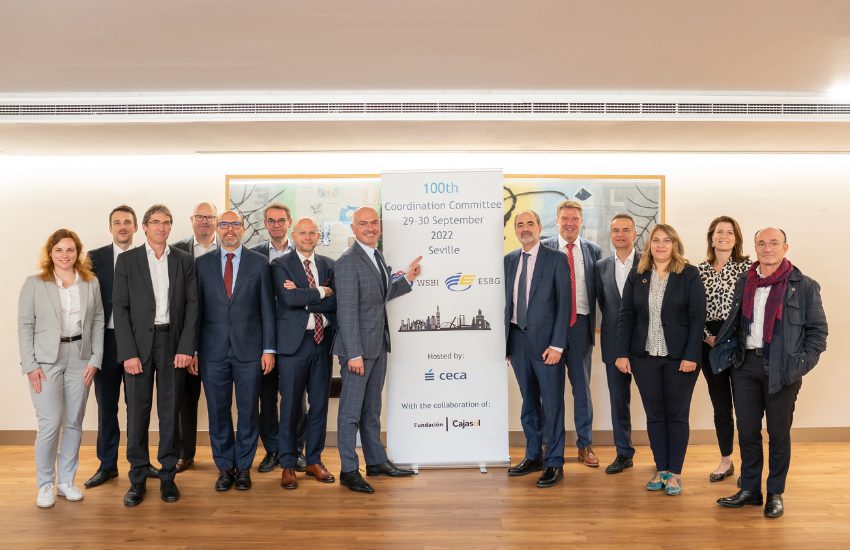Delegates from different countries gathered at the 100th WSBI-ESBG Coordination Committee to discuss the Basel IV agreement, the Banking Union project and sustainable finance, among other issues.
Martin Moloney, Secretary General of IOSCO, participated in the meeting.
CECA is an active member of the international associations - the World Savings and Retail Banking Institute (WSBI) and the European Savings Banks Group (ESBG) - representing the model of retail banking which gives priority to funding for families and SMEs, a model with which CECA member entities feel fully identified.
Representatives from both associations gathered yesterday and today at the 100th Coordination Committee at the headquarters of the Cajasol Foundation in Seville to discuss the new challenges facing the sector in terms of international banking regulation.
The participants analysed the regulatory environment from different perspectives, such as the Basel IV agreement, the Banking Union project and sustainable finance, among other issues. New technologies are driving financial innovation, which in the world of payments is advancing on several fronts; for this reason, the meeting addressed such timely trends as the future digital euro, the new MiCA regulation and the latest developments in instant payments and digital identity.
The Coordination Committee, which acts as a meeting point to coordinate the associative activity of the European Group and the World Institute, comprises the directors of the member entities and meets at least three times a year. Antonio Romero, Corporate Director of Associative Services and Resources at CECA, chairs this statutory body which supervises and advises both bodies with the aim of guiding and formulating proposals relating to the work programme and the priorities to be decided by the Board of Directors and the Presidents' Committee.
The event, which was attended by delegates from different countries, took place over two consecutive days and featured Martin Moloney, Secretary General of IOSCO (International Organization of Securities Commissions), as guest speaker.
In his speech, Martin Moloney highlighted the changing nature of competition in financial services and the importance of agility on the part of policy makers to keep up with technological innovation and the need to build a sustainable global financial market.
Representatives of the joint WSBI-ESBG office were also present, notably Peter Simon, Managing Director of the World Institute and the European Group, and Anna König, advisor to the WSBG Directorate General. ESBG was represented by Diederik Bruggink, Head of Payments and Innovation, and Dominique Carriou, Head of Regulatory Affairs.
Coordination Committee, core of the WSBI-ESBG on banking regulation
During the meeting, the working group defined the joint strategy in relation to the end of Basel III and reflected on other issues relevant to the financial sector, which are on the regulatory agenda, as well as on financial stability: Non Performing Loans (NPLs) and the prudential treatment of cryptoassets and climate risk. The current shift of the economy towards a more sustainable model, as well as the challenges and opportunities of sustainable finance have also been analysed.
Antonio Romero, Chair of the Coordination Committee and Corporate Director of Associative Services and Resources at CECA, stressed the importance of continuing to collaborate internationally among the different members of the organisation to exchange best practices that help to address global challenges, promote the harmonisation of regulatory requirements and give visibility to their social contribution.
With regard to innovation and payments, the Coordination Committee has addressed the digital euro, focusing on the collaborative project between the European Central Bank (ECB) and the five companies selected to develop user interfaces for specific use cases with this digital means of payment. In addition, representatives from the different countries discussed the latest developments in European regulation concerning electronic payment services, such as the SEPA Payment Account Access (SPAA) Scheme, which will define the procedures, rules and standards to enable the exchange of payment account information and the initiation of payment services, in a context of core services within the limits of PSD2.
In addition, it announced the celebration of the ESBG conference "My world, my knowledge, my future: a female approach to financial education”, on 27 October. A forum that will analyse the current state of financial literacy from a gender perspective with the aim of improving the financial education of women so that they can acquire the financial knowledge and skills necessary to properly manage their personal finances.
Building an inclusive and sustainable society, the focus of WSBI's business model
The link between CECA and the WSBI reflects the task of representing and defending the interests of its member entities, and to this end CECA is present in national and international forums. The WSBI helps savings and retail banks around the world to thrive. It focuses on international regulatory issues affecting the financial industry and provides a platform for knowledge sharing among member entities.
The Chairman of CECA and the "la Caixa" Banking Foundation, Isidro Fainé, renewed his three-year term as WSBI President during the General Assembly held in Paris in November 2021. Among the priority lines of work established for the coming years are financial inclusion, the promotion of sustainable finance and the exchange of best practices in the implementation of the new solvency framework and innovation, with an eye to digitalisation as a tool to improve customer proximity. The Paris Declaration 2022, approved in July during the 26th WSBI World Congress, reinforces this path set by the international body.









